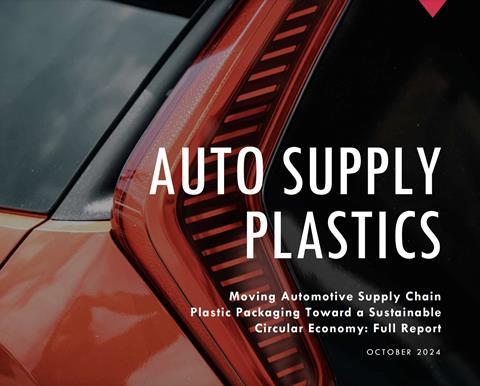The Suppliers Partnership for the Environment (SP) has published a new report in collaboration with Resource Recycling Systems (RRS) to provide information and practical guidance on increasing the recycling of plastic packaging, including internal dunnage, used to ship parts in returnable containers.
In Moving Automotive Supply Chain Plastic Packaging Toward a Sustainable Circular Economy: Full Report and Playbook, the association, which represents global carmakers and their suppliers, outlines that many different packaging materials are used to move parts damage-free through the automotive supply chain. That includes internal plastic dunnage, including foams, films and other low-weight plastics. According to SP, these materials pose greater challenges for recovery because they can be mixed material compositions and there is greater logistics complexity involved in the economic collection and transport of these materials from different facilities along the supply chain.
“We are committed to driving sustainability across the entire supply chain,” said Bridget Grewal, director of packaging continuous improvement at tier one supplier Magna. “This new report provides valuable insights and practical guidance for increasing the recycling of plastic packaging in the automotive industry, helping us to reduce waste and improve environmental outcomes.”
SP commissioned RRS, a sustainability and recycling consulting firm, to conduct a feasibility study and develop a recommended approach for increasing recycling of internal plastic dunnage and packaging.
According to SP, Fisher Packaging was also part of the team providing expertise in packaging design and plant operations. The report offers comprehensive guidance on implementing programmes to manage plastic packaging in the automotive supply chain. It emphasises the importance of collaboration to consolidate plastic waste, allowing for more efficient recycling solutions at scale.
“By leveraging our technical expertise and deep experience in recycling systems, we helped identify practical solutions for increasing the recyclability of plastic dunnage,” said Bryce Hesterman, senior consultant at RRS. “SP’s leadership and commitment to tackling these challenges truly positions them as the driving force behind meaningful change in the automotive supply chain.”
SP said the report provides guidance on the steps needed to divert plastic waste within plants, across facilities and throughout the material recovery supply chain and direct it to recycling markets that promote the highest, best use of materials.
The association said the report provides an approach and framework for individual plants to evaluate opportunities that fit their circumstance considering economic, environmental, and behavioural aspects, and outlines common barriers across the supply chain.
“SP’s sustainable packaging initiative was developed to identify new opportunities to minimize automotive packaging waste and seek to address barriers to packaging recyclability and reuse,” said Kellen Mahoney, SP director. “This study provides important new insights on opportunities for automotive companies seeking to improve economical recovery of key plastic packaging waste streams and increase access to recycling markets that reflect the highest, best use of those materials. We commend Michigan EGLE and Magna for the grant funding provided to support this project.”


























![Global[1]](https://d3n5uof8vony13.cloudfront.net/Pictures/web/a/d/s/global1_726550.svgz)














No comments yet